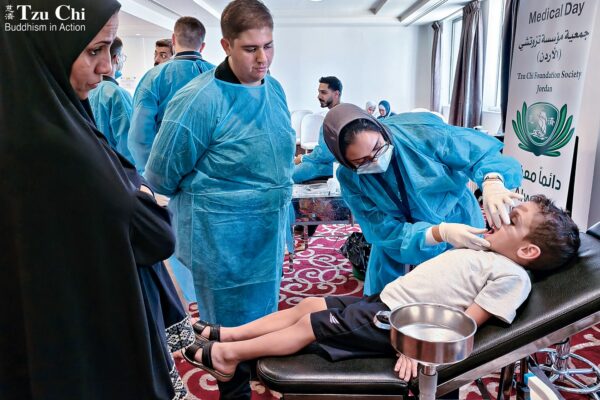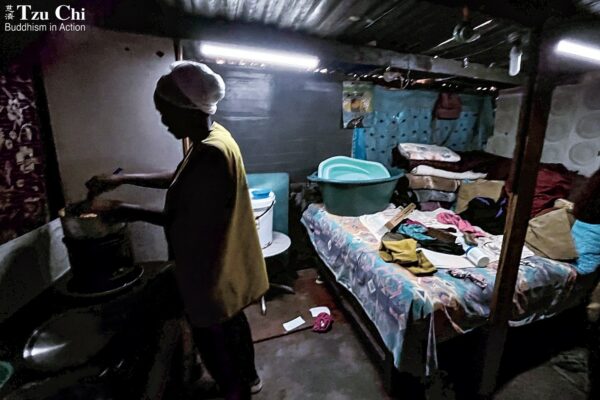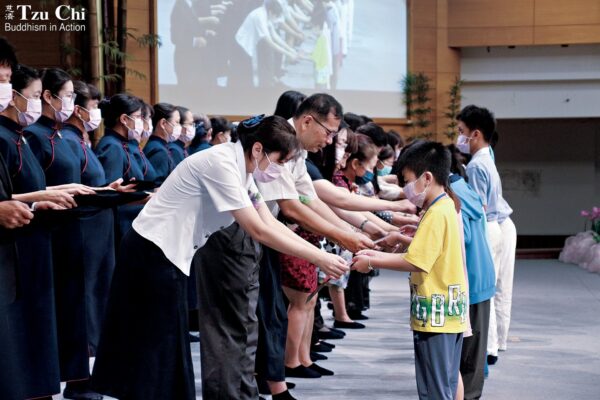By Lin Lu-qing
Translated by Wu Hsiao-ting
Photos by Chen Chiou Hwa
Her son was killed in the Syrian civil war. With Tzu Chi’s help, she rebuilt her life in Jordan and began embracing hope again.
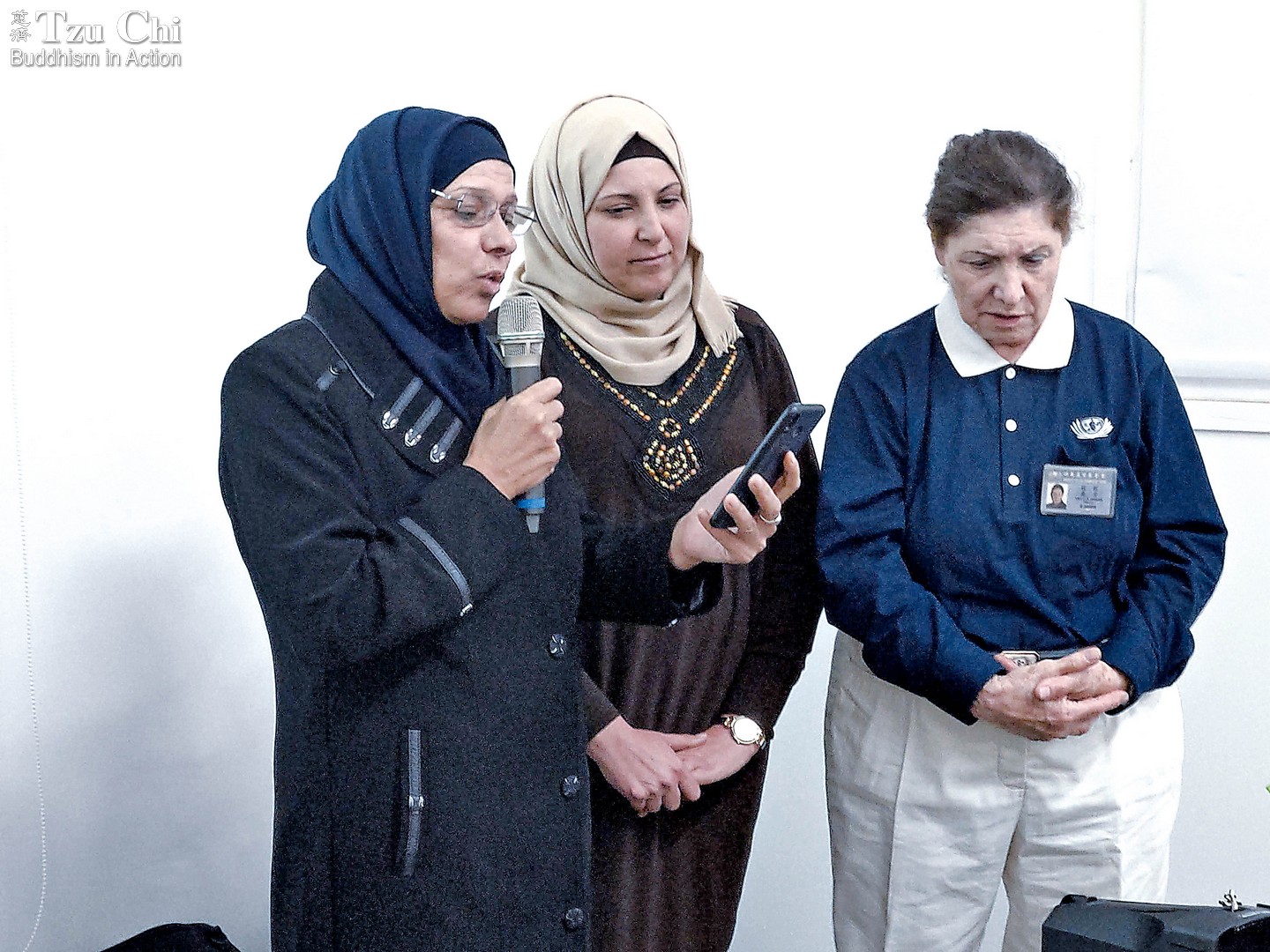
Ismahan Al Masri (left) recites a poem she wrote for Tzu Chi volunteers. She prayed for blessings for them with the poem. Courtesy of Tzu Chi Jordan
Ismahan Al Masri, 60, is from Syria. She is quiet and most often wears black in public. She gives the impression of having been through a lot of heartache in life, but has come to accept everything with poise. Every time Tzu Chi Jordan holds an activity, she travels from her home in Ramtha to the national capital of Amman to take part in the event. Ramtha is a city located in the northwest of Jordan near the border with Syria, about 90 minutes from the capital. Knowing that her finances are a challenge, Tzu Chi volunteers sometimes offer to subsidize her travel expenses, but she always declines.
In 2019, during the Muslim fasting month of Ramadan, Ismahan once again took a bus to Amman to attend a Tzu Chi event. The Tzu Chi Jordan office had invited some volunteers to the office to learn videotaping techniques that day. As usual, Ismahan listened quietly in the audience as the event progressed. When it came to an end, she surprised everyone by standing up and saying that she would like to recite a poem she had written in Arabic to dedicate to Tzu Chi volunteers. The poem she read went like this:
Let’s offer a prayer of peace
For those who built a sanctuary of love
And gave shelter to our hearts.
Let’s offer a prayer of peace
For the loving eyes
That look at us with concern from afar.
Let’s offer a prayer of peace
For the helping hands
That reach out to us with love.
Let’s offer a prayer of peace
For the bubbling spring
That generously gives and nourishes everyone.
Let’s offer a prayer of peace
For those in whose smiles we see hope
And feel our mistakes forgiven.
Let’s offer a prayer of peace
For those who free us from pain and sorrow.
Let’s offer a prayer of peace
For those who look poverty fervently in the eye.
Let’s offer a prayer of peace
For those who come from afar,
Bringing light to struggling families.
Let’s pray for their compassionate hearts
And offer up to them our love and gratitude.
Everyone was amazed when she had finished. No one knew she could write, let alone write well enough to pen such a moving poem.
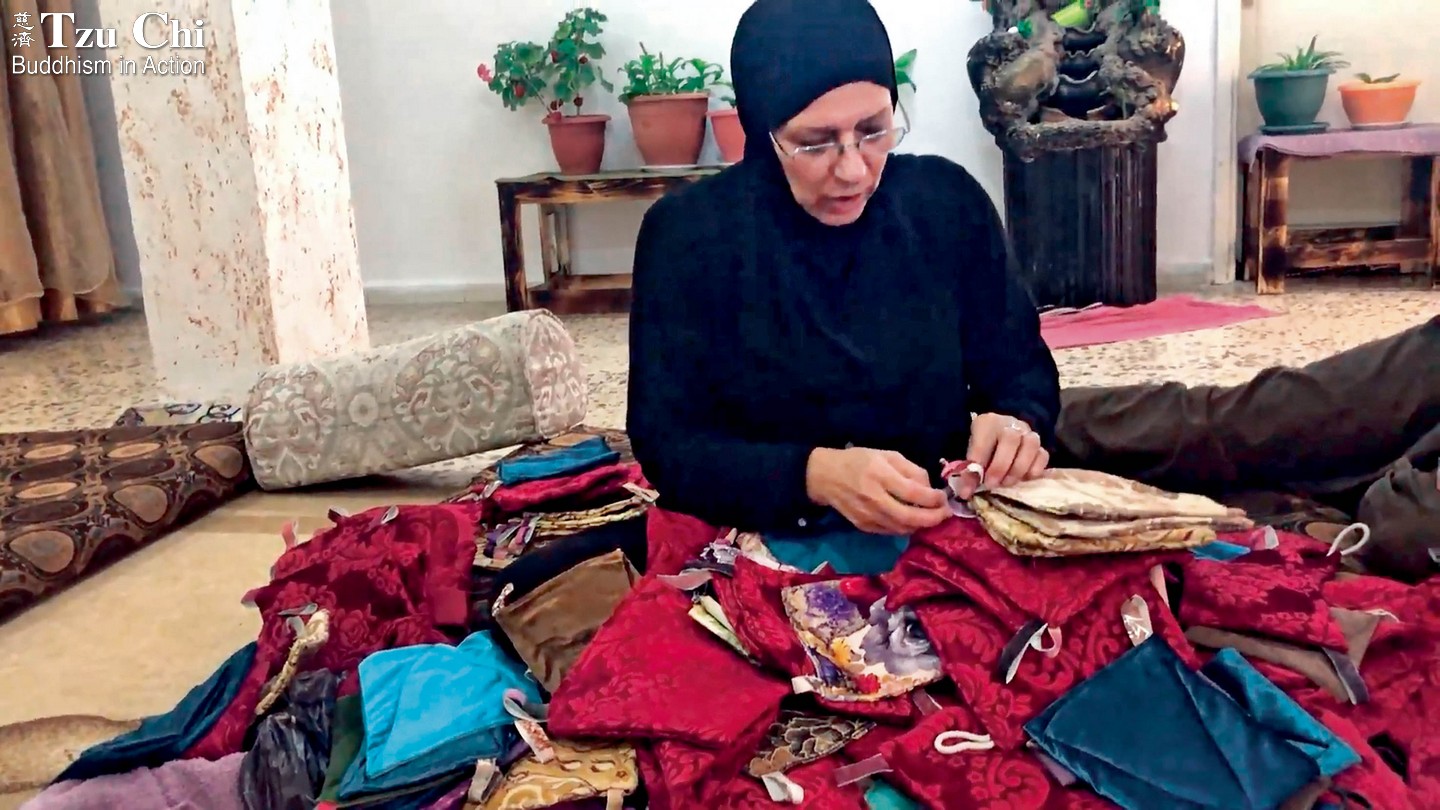
Ismahan has transformed her grief of losing her son to the Syrian civil war into a force for good. She is pictured here using recycled fabrics to make gloves for a charity sale.
A heartbroken mother
Ismahan and her family used to live in Daraa, Syria. Daraa was an important agricultural area in the south. People there were kind and unsophisticated. Ismahan’s husband, Mousa, ran a thriving blacksmith’s workshop. The couple hoped their two sons would take over his business in the future.
Sadly, that future was never to arrive. In March 2011, a civil war erupted in Syria, and Daraa was thrown into turmoil. The couple wanted to uproot their family and flee to Jordan, but their older son, Ali, refused to leave. Not wanting to leave without him, the family stayed. After persisting for more than a year, Ismahan and Mousa finally decided to leave with their younger son, Ali’s two-year-old daughter, and his wife, who was six months pregnant. Ali, 24 at the time, decided to stay and join the Free Syrian Army.
After arriving in Jordan, the family stayed separately with different families, and even lived for a spell in the Zaatari refugee camp. Life was difficult, but for Ismahan, it couldn’t compare with the pain of worrying about the safety of her older son. In July 2013, Mousa decided to take a risk and return to Syria to accompany Ali. Sadly, just two months later, Ismahan received the news she had most dreaded.
September 28, 2013, was a day Ismahan will never forget: her beloved son was killed in battle that day. His comrades held a funeral for him. Before her husband came home, Ismahan asked him to bring back the clothes her son was wearing when he died. Her husband did as asked, bearing the tragic burden back to his wife. Clutching her son’s blood-stained pants to her chest, Ismahan was beside herself with grief.
Chen Chiou Hwa (陳秋華), the head of Tzu Chi Jordan, recalled the first time he met Ismahan. “She held the pants and cried in front of us,” he said. “Smelling the pants, she said her son’s blood was more fragrant than perfume. That was such a sad scene.” Chen vividly remembers how even the air at the time was saturated with heartrending sorrow.
By then, Ismahan and her family had been settled in Ramtha for more than half a year. Tzu Chi and a local charity were working together to help them. When Tzu Chi volunteers in Amman learned that the family had lost their son, they visited them to extend their condolences and see whether there was anything they could do to help. Tzu Chi began providing long-term aid to them afterwards, helping them with their medical needs and easing their financial burdens.
Tzu Chi volunteers visited the family every month. Touched by their care, Ismahan said, “No one has made us feel as safe as Tzu Chi. Tzu Chi has eased the pain and mental torture the war has caused us.” Gradually, she began joining Tzu Chi volunteers in doing good and helping others.
In February 2018, a 6.4-magnitude earthquake hit Hualien, eastern Taiwan, toppling buildings and killing 17 people. When the news reached Jordan, Ismahan decided to help with Tzu Chi’s relief work for the quake by sewing gloves out of recycled fabric and donating them to be sold. She also made woolen caps and donated them to refugee children.
In late 2021, when Jordan was going through the fourth wave of COVID-19, Ismahan tested positive for the infection. She asked Tzu Chi for help in mid-December, and after treatment with medications and an oxygen concentrator, she recovered and regained her health. She was deeply thankful to Tzu Chi volunteers, who checked on her every day. She paid forward their love afterwards by helping Tzu Chi care for others in Ramtha infected with COVID-19. Whenever someone tested positive and needed an oxygen concentrator, she asked her younger son to sign them up for help and deliver a concentrator to them.
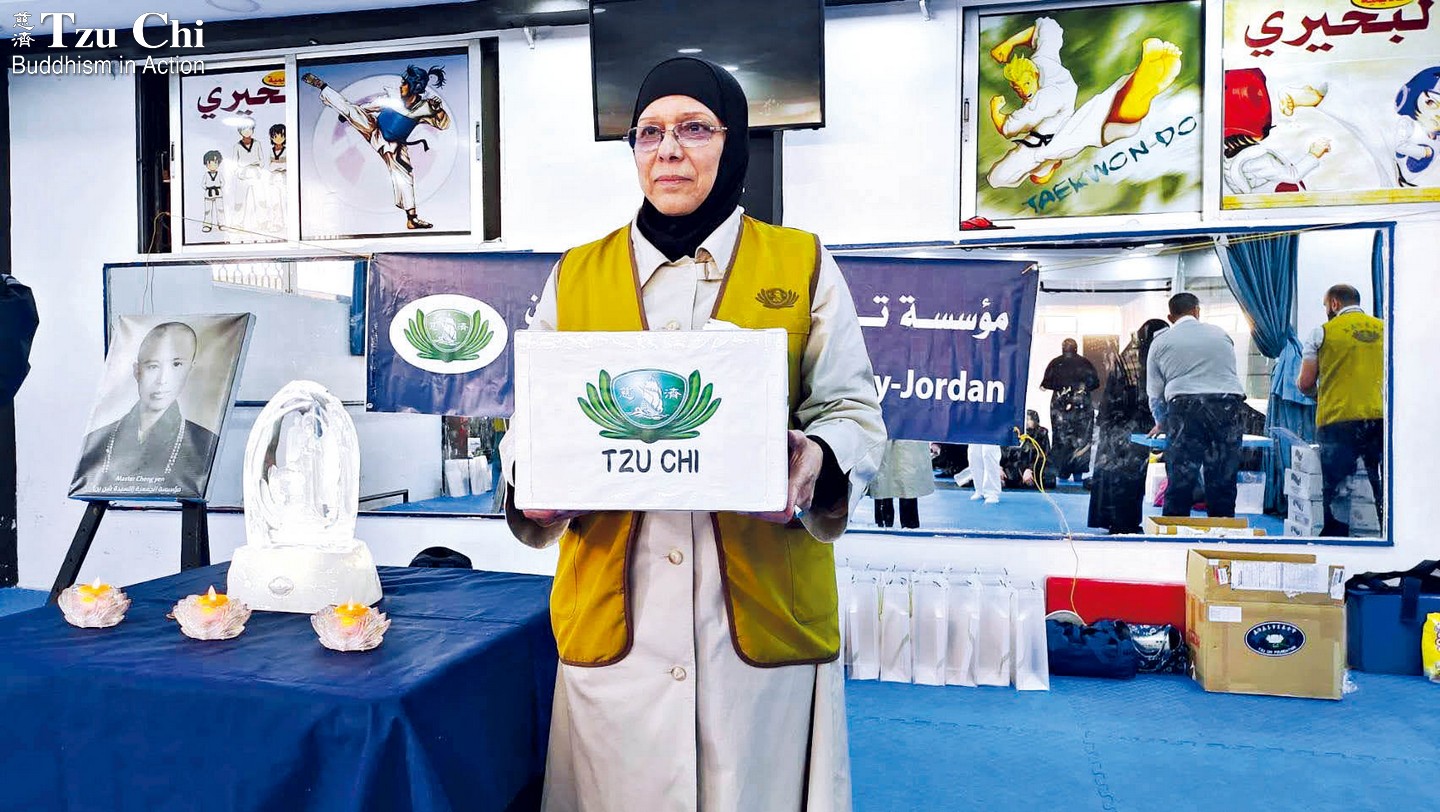
Holding a donation box, Ismahan solicits donations for Tzu Chi at a Tzu Chi event.
Love emerging from pain
Ismahan had a study with a large collection of books when she was living in her hometown in Syria, and was in the habit of recording her family life. She inherited her father’s talent for writing; her work is powerful and moving. “I put everything that occurred to me in writing—that was my way of life,” she said. Though her copious writings were destroyed in the war, they still live in her heart.
She often volunteers for Tzu Chi now, with her five-year-old granddaughter in tow. She treasures and cherishes a letter wishing her the best written to her by Dharma Master Cheng Yen. The letter makes her feel that thousands of miles away there is someone who really understands her. She has even written a poem for the Master:
When darkness shrouds me,
You are the moon that illuminates me.
The sun shines its rays on us
Because of my beloved you.
You allow me to embrace hope again.
You give my family and me happiness.
Your heart, full of love, erases my sorrow.
You are the mother who bears all my heavy burdens.
Your heart is as broad as can be
As you call on everyone every day
To give others love and security.
I’m doing my best to sow seeds of goodness
Until every place becomes green.
We plant kindness, love, and hope
To pass them on generation after generation.
Tzu Chi volunteers have been visiting and caring for Syrian refugee families in Ramtha—such as Ismahan’s family—for ten years. When Ismahan, her father, and her husband needed surgery to remove their cataracts, Tzu Chi subsidized the cost for them. When Ismahan’s brother’s family was being accepted into Germany, Tzu Chi paid for their plane tickets so that the family could immigrate to Europe.
“When my life was at its most difficult, Tzu Chi gave me unconditional love,” Ismahan said. “I’m now a part of Tzu Chi. I’ll reach out whenever I meet people in need of help.” She pledged to live out Master Cheng Yen’s teachings for as long as she lives.
Ismahan’s heart harbors pride for her son. She might not be able to completely heal from his loss, but has transformed her grief into a force for good. Her story has inspired many Syrian mothers who have had a similar experience. Life is an echo. When you send out love, it comes back to you. Ismahan is looking toward the future with a heart full of gratitude. “Let our hearts and the entire world become more beautiful,” she prays.

